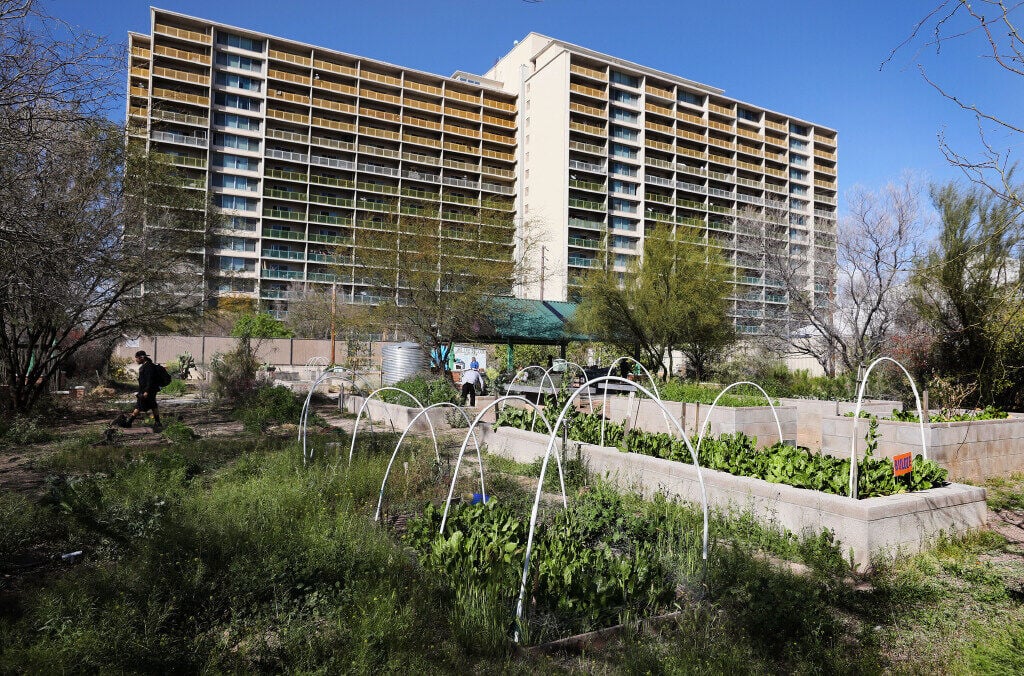Tucson is set to receive $50 million in federal funding to create three new housing developments while rehabilitating the Tucson House public housing high-rise, officials announced Wednesday.
The funding comes from the U.S. Housing and Urban Development Department’s Choice Neighborhoods program that awards grants to revitalize struggling neighborhoods with "distressed public or HUD-assisted housing."
In Tucson, the money will go toward the comprehensive Thrive in the ‘05 initiative by creating 550 new or rehabilitated housing units, says a news release from the city.
"This is a transformative grant, not just for the people who live in the (Thrive in the '05 area) but for all Tucsonans," Mayor Regina Romero said.
Tucson launched the Thrive in the '05 project in 2018 to target the 85705 ZIP code along the 2.3-square-mile Oracle Road and Miracle Mile corridor in attempts to reduce crime, promote economic development and improve housing and community services in collaboration with area residents and businesses.
Miracle Mile used to be a tourist destination, Romero noted, "and we want to make sure it continues to be a thriving area of our community."
The plan is anchored in the historic 17-story Tucson House, the city's largest public housing site, which mostly houses low-income older and disabled adults. Built in 1963 as a luxury high-rise apartment building, it was converted by the city to public housing in 1979.
Now, Romero said, the plan is to turn the 408-unit tower at 1501 N. Oracle Road into a mixed-income community for those 55 and older.
"(HUD) wants to deconcentrate poverty. So the Tucson House will continue to have affordable housing, but it will have mixed income as well," she said. "What what we're doing is trying to spread the affordability around the entire (85705 ZIP code)."
Romero said "we're not going to unhouse anyone," and the city's housing department has a strategy to ensure the Tucson House's current residents retain housing.
In addition to the long-planned physical renovations of Tucson House, the new federal funding will “increase the inventory of mixed-income and affordable residential units in the surrounding area” through three new housing developments, the city said, while providing “on-site services including wrap-around case management for current Tucson House residents.”
The city plans to use the HUD funds in part, Romero said, to build family apartments where the Bum Steer restaurant was formally located on Stone Avenue and to build additional housing at the Amazon Motel property it recently purchased.
City Council members, meeting as the Public Housing Authority, approved a master development agreement with affordable housing developer Gorman & Company on July 18 to partner as a co-developer for Tucson House improvements and other potential housing projects that arise, with the help of the new federal funds.
Gorman has completed construction on 1,769 housing units across the state, according to city officials, and has experience rehabilitating tower buildings like Tucson House. The company helped the city create concept designs as part of the Choice Neighborhoods grant application.
Tucson contracted with architecture firm Poster Mirto McDonald to update a physical assessment of Tucson House in 2019. The firm wrote in a letter to the city that while some improvement had been made to serve the financially vulnerable residents of the housing complex, “the need for long-term physical improvements cannot be understated.”
“In general, the existing physical conditions of the Tucson House have continued to deteriorate, and major reinvestment is needed to keep the Tucson House as a viable part of (housing and community development's) housing portfolio,” Poster Mirto McDonald wrote.
The architecture firm placed the total project budget estimate on the renovations at more than $67 million in 2019, and it’s unclear what the current scope and cost of the project will be. Gorman will temporarily relocate Tucson House residents who can’t stay in their units during renovation, according to the city.
The city allocated $5 million to replace Tucson House’s elevators as part of its fiscal year 2024 budget, and Tucson’s Housing and Community Development Department anticipates contributing $1 million in HOME grant funding from HUD that assists low-income families with affordable housing. The housing department also plans to use HUD’s Community Development Block Grant funds to build a health clinic next to the Tucson House.
Romero said U.S. Rep. Raúl Grijalva, D-Tucson, championed the $50 million grant by advocating for the project in letters to HUD.





